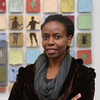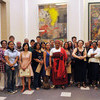From student tutor to associate professor
15 February 2022 | Story Niémah Davids. Photo Supplied. Read time 8 min.
For most academics who are in the clutches of a PhD, applying for a new job is simply out of the question. And who can blame them – they spend late nights submerged in their research project while attempting to conclude the gruelling journey successfully, which is often their sole focus. For Associate Professor Shannon Morreira it was the opposite.
In January 2013 she was midway through writing her final PhD draft and eight months pregnant with her firstborn son when an opportunity came knocking. The newly created position of lecturer in the then recently established Humanities Education Development Unit (EDU) in the University of Cape Town’s (UCT) Faculty of Humanities caught her eye. Associate Professor Morreira jumped in boots and all and applied for the job, and much to her delight she was successful.
“And so, I found myself finishing off my PhD and designing a new course from scratch for the EDU while I was eight months pregnant. It was a busy time, but both the course and the baby turned out just fine,” she said jokingly.
It’s been nine years since then, and Morreira’s journey with UCT came full circle when she attained her promotion to the professoriate at the end of 2021. This promotion has been a longtime dream – since those early days as an undergraduate student tutor.
“My teaching career started as a student tutor, and here I am today.”
“I came to UCT as an undergraduate student in 2002 and I’ve never left. My teaching career started as a student tutor, and here I am today. Joining the professoriate feels like a real recognition of my work over the years and it is absolutely heartening,” she said.
A cup runneth over
Morreira is a social anthropologist by training and completed her PhD in social anthropology in 2013 under the direct supervision of the “inestimable” Professor Fiona Ross. Back then she was based in UCT’s Department of Anthropology – her home away from home.
But that all changed when she joined the Humanities EDU. Her role in the unit is multifaceted. She has designed and continues to teach interdisciplinary foundation courses in social science, and currently leads a faculty project on curriculum redesign on decolonial principles.
In addition, Morreira has also designed and taught both undergraduate and postgraduate courses in anthropology and African studies, and these days she supervises postgraduate students in UCT’s School of Education and in the Department of Anthropology. She also serves as the co-editor of Critical African Studies – an international peer-reviewed academic science journal.
“I love so many things about my job. The fact that I’m positioned in a cross-faculty unit is a real joy. I work across departments on curriculum and course design; I teach in the EDU and in anthropology; I supervise in the School of Education and in the Department of Anthropology. So, no semester ever really looks the same, which makes life interesting,” Morreira said.
Teacher and researcher by heart
Morreira’s research centres on the impact of coloniality on contemporary life in Southern Africa. This, she explained, includes human rights law, alternative forms of justice, citizenship and diaspora studies, and higher education studies.
And while it might sound complicated, what it really means is that she’s interested in what Southern Africa has inherited post-colonialism, and how that affects and limits our interpretations and understandings of various aspects today.
“My work aims to ask how we, in Southern Africa, can think differently about the kinds of knowledge we see as legitimate and what kinds we don’t.”
Her research explores the kinds of teaching systems higher education institutions consider appropriate and legitimate, and in turn what forms of pedagogies those silence. Her research also seeks to answers other questions such as: What forms of justice are legitimate and why? Where do these systems come from and are they equitable today?
“In summary, my work aims to ask how we, in Southern Africa, can think differently about the kinds of knowledge we see as legitimate and what kinds we don’t. I love that part of my job is to conduct research, to read and to write.”
To date, Morreira has published one monograph, one edited book and approximately 20 journal articles and book chapters on her research. Over the years she has also received a list of impressive awards including the UCT College of Fellows Young Researcher Award; the UCT Meritorious Publication Award; the Faculty of Humanities’ Research Committee Award for Outstanding Research to a new scholar; as well as the UCT Collaborative Educational Practice Award.
The ups and downs
The past nine years as an academic at UCT have been like a rollercoaster ride – thrilling and scary and include many highs and lows. For one, she said, watching her students graduate has always been one of the highlights of her year; conducting research in an area she’s passionate about; and working alongside talented and established young scholars from across the continent as they publish their work gives meaning to each new day.
“That was a deeply formative time for me, and I am hugely grateful for the conversations and debates that were opened by a generation of very brave students.”
But it has not always been smooth sailing. In fact, Morreira said, transitioning from a PhD student to a permanent member of UCT’s academic staff shortly after she had just given birth was difficult. Similarly, the #RhodesMustFall and #FeesMustFall protest movements were challenging too but influenced her thinking in a positive way. Today, much of Morreira’s work in curriculum change is informed by mind shifts that were put in place during the protest action.
“Most of the students I teach are young, black students funded by the National Student Financial Aid Scheme, and many were at the forefront of these protests. That was a deeply formative time for me, and I am hugely grateful for the conversations and debates that were opened by a generation of very brave students,” she said.
Further, teaching during the COVID-19 pandemic, especially during those early days in 2020, was an arduous task too. Home-schooling two children under the age of seven, while lending a hand to set up the faculty’s distance learning system and redesigning courses for online learning was not a walk in the park.
“I am so grateful to my parents who helped me to keep my home life ticking during that terrible time, and to all my colleagues, we became stronger and better than ever before,” Morreira said.
Return to class
After a whirlwind two years Morreira is excited to return to class to teach students face to face for the first time since March 2020. But teaching will be short-lived as she prepares for her sabbatical in April. During this time, she will focus on writing and editing a book in partnership with academics at UCT, the University of Mexico and the University of Auckland. The book, she explained, aims to surface and extend concepts and categories of analysis from the Global South.
“Social analysis in the academy still tends to use theoretical concepts that have emerged from a Euro-Anglo history of thought and [those] are assumed to be universal. But there is theoretical validity to the multiple knowledge systems, categories and concepts at play in the everyday worlds of the Global South,” she said.
Despite this very busy schedule, this National Research Foundation (NRF) Y1-rated scholar also believes in the importance of family time. So, there’s always plenty of time for walks in the mountain with her husband and two young children, and lots of impromptu teas with her parents – who live right next door.
“It’s the little things that count and in the midst of the madness it’s important to not lose sight of that,” she said.
 This work is licensed under a Creative Commons Attribution-NoDerivatives 4.0 International License.
This work is licensed under a Creative Commons Attribution-NoDerivatives 4.0 International License.
Please view the republishing articles page for more information.
Centre for Higher Education Development
In the news


.jpg)
















































































































































































































